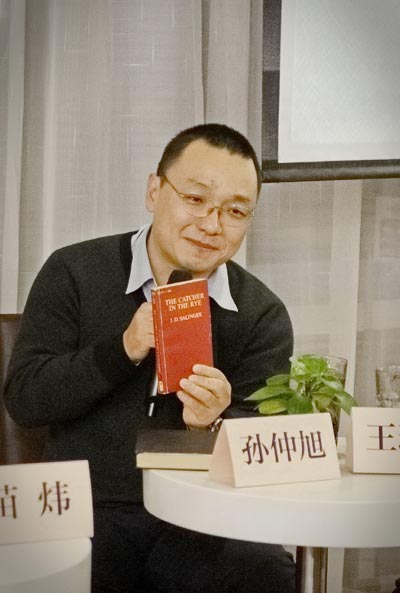 |
|
Sun Zhongxun, who committed suicide on Aug 28 at the age of 41, at a commemorating meeting in 2013 for the Chinese translation of The Catcher in the Rye, a 1951 novel by J. D. Salinger. Sun's translation of the novel was published in 2007. He suffered from depression prior to his death. China Photo Press
|
The recent death of respected translator Sun Zhongxun has prompted online discussion about pay for literary translation in China. Some Chinese social media users have asked if Sun was paid enough by publishing houses to sustain a decent life.
The topic has been in circulation for a while.
On Sept 4, Liao Zenghu, director of the editorial department of the literary periodical Harvest, cited a two-year-old report by the China Youth Daily on Sina Weibo, and accused Yiwen Publishing House of exploiting translator Wang Zhiliang in the early 1990s by paying him only 600 yuan ($97) for his translation of Russian poet Ivan Turgenev's voluminous poetic works.
Yiwen Publishing House issued a statement on Sept 9, showing archived receipts of payments of more than 2,300 yuan to Wang. Yiwen said that it had strictly followed the guidelines for translation payments set by the government.
Liao didn't respond to that statement, but he told reporters that his intention was to call attention to the plight of translators.
Although China's GDP has increased more than tenfold in the past two decades, the rates for literary translation have hardly caught up with the rise in income of other professions.
Liu Wenfei, a member of the Translators Association of China, says that during the 1950s, when the average salary of ordinary people in China was just a few dozen yuan, the translation rate was comparatively higher than it is today.
Ye Shuifu, a senior translator in China, for instance, earned 9,000 yuan in the 1950s for translating Russian writer Fadeyev's novel The Young Guard, Liu says.
"Ye later bought a courtyard near Wangfujing street in central Beijing. It should be worth tens of millions now," Liu says.
"It usually takes one year to translate a novel or two, and the translator can only earn roughly between 10,000 to 20,000 yuan from each book. But the monthly salary for a university professor is already about the same."
Liu is also a professor of Russian literature at the Chinese Academy of Social Sciences, the country's top think tank.
According to Liu, many senior literary translators do it part-time, out of love for translation and not purely for the money they earn. Such translators are usually employed full-time as professors of foreign languages or have retired.
"One can barely make a living in Beijing just by doing literary translation work alone."
We recommend:
